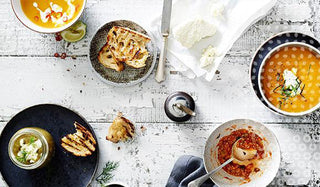1. Eat breakfast every day
It is so important to kick start your metabolism if you want to manage your weight. Some research suggests we should be consuming half our daily kilojoule intake in the morning....that’s a pretty big breakfast...fruit, wholegrain breakfast cereal, low fat milk/yoghourt, even an egg on wholegrain toast is great provided it’s cooked without fat and served with the lot...baked beans, tomato, mushrooms and spinach.....not a bacon rash in sight. Breakfast skippers are more likely to be overweight than breakfast eaters.
2. Don’t skip meals
No matter how rushed you are resist the temptation to power through the day on an empty tank. You’ll ‘hit the wall’ either mid morning or mid afternoon and be forced to tear open the packet of biscuits or bag of lollies for a quick sugar fix to top up the fuel tank. You will be much better off to prepare for the times when meals may be delayed by having a stash of healthy snacks with you either at work or in the car. Fruit is always a great choice, even the fruit snack packs are convenient and portable. Dried fruit and raw nuts are also good snack choices for people on the run.
3. Always leave the table feeling you could eat a little more
With around 60% of us Aussies overweight, it’s fairly evident that we are either eating too much or exercising too little and it’s probably a combination of the two. To prevent overeating ,we need to become more in tune with our hunger and our feelings of fullness. In other words eat when we are hungry and stop when we feel satisfied rather than uncomfortably full. As one wise woman once said the best exercise for losing weight is to push yourself away from the table!!
4. Don’t confuse hunger with thirst
We see it in children and it makes sense that some adults will experience the same. When you feel like something to eat make sure that it is food that you really need and not fluid. It’s a good idea to have a drink of water if you feel like something between meals because it may well be that you are thirsty and not hungry. A study in overweight women showed that having 2 glasses of water (500ml) before a meal reduced the quantity of food consumed at that meal.
5. Serve your food on a plate
It’s really a way to allow our brain to register how much we are eating. By putting our food on a plate or bowl rather than eating out of a box or directly from the fridge we are more likely to eat less. Instead of standing at the fridge or pantry when you get home from work shovelling whatever you can into your hungry mouth , get a plate and put the food on that plate, then sit down and take your time and enjoy.
6. Slow down you eat too fast
This is a way to also reduce overeating. By allowing at least 20 minutes to eat your meal, you give your brain time to register that you are satisfied. The best way to slow down is to take small mouthfuls, chew your food well, put your knife and fork down in between bites and join in the conversation, if not eating alone of course!
7. Turn off the television at mealtimes
And so end mindless eating. There are so many good reasons for eating together as a family at the dining table …not only can you attempt to solve the problems of the world but it creates a forum for family issues to be discussed without having to wait for the ad break!. From a nutrition point of view, eating together as a family allows children to observe their parents eating patterns and table manners. In addition it has been shown that families who eat together have a better diet than those who don’t.
8. Eat rainbows
A cute way of describing the ‘eat by colour’ philosophy. How do you know if you are eating a healthy diet? Besides being a dietitian and calculating the recommended intakes for protein, fat, carbs and vitamins and minerals…one of the easiest ways is to ensure that you always have a colourful array of foods on your plate. The best way to do that is to include lots of fruits and vegetables in your diet…it’s amazing how adding a salad or wonderful summer fruit can boost your intake of the powerful antioxidants counteracting the damaging chemicals in our bodies and offering some real health benefits.
9. Keep track of your weight
Even though the scales are not measuring body fat specifically, it is still a good idea to weigh yourself weekly to monitor what’s happening with your weight. The best time to weigh is first thing in the morning after you have been to the toilet, with minimal clothing and before breakfast. Another great way to see if you are keeping in shape is to measure your waist circumference. Too much fat around your middle increases your risk of developing Type 2 diabetes, high blood pressure and heart disease…so get that tape measure out and wrap it around your waist …don’t squeeze too tight…if you are female aim for less than 80cm and if you are male no more than 94cm.
10. Herb and spice up your diet
Eating food that tastes great is very important but adding herbs and spices to your diet does much more than just add flavour… herbs and spices are rich sources of antioxidants . Research has shown that by adding a tablespoon of herbs to a salad you can increase the antioxidant capacity of that salad by over 200%.Try adding oregano and mint to your Greek salad, a few basil leaves to your tomato salad and lemongrass, ginger and chilli to your favourite Thai salad dressing.
Article written by Karen Inge, and first published on www.kareninge.com.au


